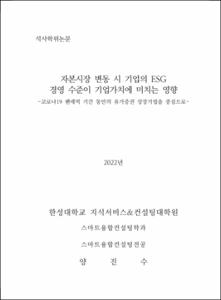자본시장 변동 시 기업의 ESG 경영 수준이 기업가치에 미치는 영향
= The Effect of a Company's ESG Management Level on its Corporate Value when the capital market fluctuates
- Type
- Thesis
- Alternative Title
- 코로나19 팬데믹 기간 동안의 유가증권 상장기업을 중심으로
- Advisor
- 김태영
- Department
- 지식서비스&컨설팅대학원 스마트융합컨설팅학과
- Issued Date
- 2022
- Publisher
- 한성대학교 지식서비스&컨설팅대학원
- Appears in Collections:
- 스마트융합컨설팅학과 > 1. Thesis
- Files in This Item:
-
-
Download
 200000593938.pdf
기타 데이터 / 1.59 MB / Adobe PDF
200000593938.pdf
기타 데이터 / 1.59 MB / Adobe PDF
-
Items in Repository are protected by copyright, with all rights reserved, unless otherwise indicated.